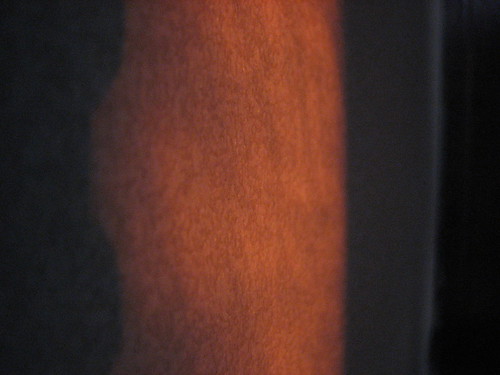
When Evening Becomes Stellar
Orchid sky seeps through
our window veiled with branches.
The day heals itself in amethyst
fever, entangled limbs.
Iridescent corona,
keep safe your ivory
light. My calf's tusks
are attached to the skull
of the sun. Ancestors
run under our bellies
like clans of mule deer
sinking into sky's velvet.
There is the constant beat
of prowlers' paws on the desert
drum, a watering hole
to find, there are pairs of teats
gorging with white. In the cover
of bosque and penstemon, a she
beast is born, unafraid:
with trembling legs.
--Emmy Perez
(The Wind Shifts: New Latino Poetry, Francisco Aragon, Editor, University of Arizona Press, 2007.)
***
"When": the whole of the poem is here, at its outset, where nearly every attempt to hold in place a healing between time in motion and bodies in time is suspended in a a single moment of becoming. "When Evening Becomes Stellar." The tensions are all here too, for "when" isn't really a beginning as much as it is a an interruption, a turning point in which the day closing down "seeps through / our window," making time nearly visible in the changing light. But as always, it is only visible through a window of seeing, a tangle of obstacles, that both veil and reveal what is and what is about to become. Night is arriving, and with it, darkness, but not yet. Not just now when the evening, a time of before-ness, a time of erotic announcement, prevails in a dramatic purpling of vision.
The stars will arrive too, and soon, but just as we'd give over to their distant remove and look away, we are turned back again, to a single star, to the setting sun, hailed in a wistful apostrophe: "Iridescent corona, / keep safe your ivory / light." But what is there to keep safe against? Not against the shadow of the turning earth, and not against another cyclical usurpation of darkness. Not when the crowning moment of the poem is an imperative that breaks open the constellations between this voice, human and longing, and this body of light. It is not, after all, the light of day that must be kept, but what it signals as it arrives at the window. It is a deep and ancient conversation carrying on between these two, one that is grounded in the white bones running through the legs of the bodies standing in the tracks of the sun where the bones are bleached bare in its stead: "My calf's tusks / are attached to the skull / of the sun." The image is complicated, resonating in a strangeness that brings together the human journey on foot and the herd animal's (javelina? bison?) death on the wayside. The skull becomes as much the place where the sun rests in reflection as it is the enclosure of the light of the mind: light inside and out is jointed at the mouth where light enters, where voice exits, and where hunger tusks into the light of the air from its jaw.
All of this play on the materiality of light and its interchangability with thought prepares us for the collapse of generations, "Ancestors under our bellies,"mythic past and present, into the surrounding (invisible) field of life that is animated--no, birthed into being--by the onslaught of night: "clans of mule deer / sinking into the sky's velvet," "the constant beat / of prowlers' paws on the desert," "pairs of teats / gorging with white." And again, the poem returns us to the desire to slake thirst, pointing towards water, towards milk, yes, but primarily towards finding, locating, connecting, healing, which is the first impulse of these lines. The same attempt made in the beginning at "When" and "Becomes" is reiterated now at "a watering hole / to find," as well as in "sky's velvet" touching down on the velvet of deer hide, and as well as in the "prowlers' paws" finding the pulse of the "desert drum." So much so, that the poem could only end with a parallel to the branch-entangled sun in the window, another veiled becoming:
In the cover
of bosque and penstemon, a she
beast is born, unafraid:
with trembling legs.
The river oasis of the bosque is rife with this birth, and though it is also a separation, one beast from another, the animal's unsteady legs, we know, will carry her to attachment where she will heal the great distance between her and her m(other) in an all consuming nurture. In this close, we are reminded of the necessary relationship between the poem's speaker and the setting light, between the sun and our ancestors, and between our ancestors and this landscape of beasts. It is a crown of mothers, a halo of mouths opening into more. Stellar, this "our" keep at the window.
***
Revelation 12:
1 And there appeared a great wonder in heaven; a woman clothed with the sun, and the moon under her feet, and upon her head a crown of twelve stars:
2 And she being with child cried, travailing in birth, and pained to be delivered.
***